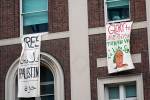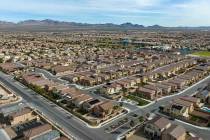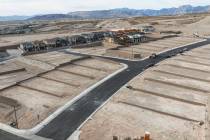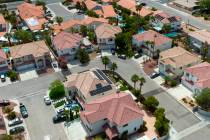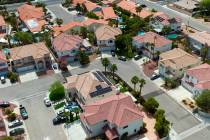Nevada expects $43 million to help with foreclosure crisis
Nevada is expected to get $43 million in additional funding from the government to stabilize neighborhoods hardest hit by the foreclosure crisis, HUD Secretary Shaun Donovan announced Wednesday.
The funding is part of $1 billion awarded through the U.S. Housing and Urban Development’s Neighborhood Stabilization Program, which helps local governments acquire, redevelop or demolish foreclosed properties.
"These grants will support local efforts to reverse the effects these properties have on their surrounding neighborhoods," Donovan said in a statement from Washington, D.C. "We want to make certain that we target these funds to those places with especially high foreclosure activity so we can help turn the tide in our battle against abandonment and blight."
Nevada leads the nation with one in every 82 housing units receiving a foreclosure filing in July, Irvine, Calif.-based RealtyTrac foreclosure listing service reported. A total of 13,727 Nevada properties received a foreclosure filing in July, up nearly 7 percent from the previous month.
Clark County is slated to receive $20.3 million in third-round funding, Las Vegas $10.5 million and Henderson $3.9 million.
Nevada competes for funding allocation with more populated states such as California and Florida, said Ken LoBene, director of the HUD office in Las Vegas.
The distribution formula weighs several factors to match funding to need in the most distressed neighborhoods based on the number and percentage of homes in foreclosure, homes in delinquency and homes financed by a subprime mortgage loan.
The formula takes into account causes of foreclosures and delinquencies such as price declines from peak levels, increases in unemployment and rate of highly leveraged loans. HUD also looks at the number of vacant homes in a neighborhood with severe foreclosure problems.
Nevada has received more than $130 million through the Treasury’s "hardest-hit" fund since it was first announced in March 2009, though many homeowners said they had trouble contacting the nonprofit organization that was set up to distribute the funds.
"There has been some very positive things from this," LoBene said. "We helped 500 homeowners in the first round. The problem is the enormity of the number of foreclosures and defaults overwhelmed what we can do. We’re trying to plug a $50 million hole."
The HUD official said there’s an hierarchy of needs targeting the hardest-hit neighborhoods with the most vacant homes. Some of the money is going toward maintaining lawns and paying HOA fees.
State and local governments can use the money to acquire land and property; to demolish or rehabilitate abandoned properties; or to offer down-payment and closing-cost assistance to low- and moderate-income homebuyers.
Rep. Dina Titus, D-Nev., who supported additional funding, said she’s confident the funds will bring stability to Southern Nevada if they’re used quickly and efficiently.
"There is not a one-size-fits-all solution to this crisis and these funds will allow local governments to respond to the individual needs of the housing market in their communities in Southern Nevada," Titus said in a statement.
Contact reporter Hubble Smith at hsmith@reviewjournal.com or 702-383-0491.
Neighborhood Stabilization Program• Clark County, $20.3 million
• Henderson, $3.9 million
• Las Vegas, $10.5 million
• State of Nevada, $5 million
• Reno, $2 million
• Washoe County, $1.7 million
• Total, $43.3 million
SOURCE: U.S. Housing and Urban Development







